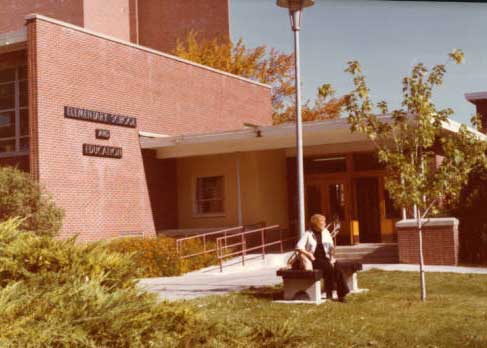University Communications and Marketing
June 20, 2019

Master's programs in College of Education continue history of excellence
Contact:
University Communications and Marketing, 657-2266
MSU BILLINGS NEWS—Montana State University Billings, formerly known as Eastern Montana State Normal School, opened its doors in 1927 to students looking to pursue two-year certificates for elementary education. Since its beginning, the school has grown to include five colleges offering certificates, associate degrees, bachelor’s degrees and master’s degrees to students who arrive at the campus nestled under the Rimrocks.
MSU Billings has always had roots in education. Its first president, Lynn McMullen, was dedicated to building the university from the ground up. A prominent figure on campus, McMullen told those he met that his hobby was “the training of teachers for service” (Hart 10). McMullen took a “hands-on” approach to teaching students at the Eastern Montana State Normal School, a tradition that continues in the College of Education to this day. McMullen also pushed for a rigorous education outside the “traditional” teacher education courses offered and to teach students “to ‘teach the people they’d come from’” (Hart 10), or encourage students to learn by doing.
The College of Education has continued the traditions of a rigorous education set by McMullen, however, several changes have emerged since his time leading the institution. First, the university now offers bachelor’s and master’s level education degrees, a change that emerged due to the need for well-educated individuals in schools. The second change is that the university has expanded to offer associate degrees, bachelor’s degrees and master’s degrees in five colleges including the College of Arts and Sciences, College of Allied Health Professions, College of Business, College of Education, and City College.
A third change is accreditation of the COE and individual programs within it. The College of Education (COE)’s Master of Science in Special Education Advanced Studies, Applied Behavior Analysis (ABA) emphasis at Montana State University Billings was recently awarded full accreditation through the Association for Behavior Analysis International (ABAI). The Educator Preparation Program has long been accredited by the Montana Board of Public Education and by the Council for the Accreditation of Educator Preparation (CAEP), previously the National Council for Accreditation of Teacher Education (NCATE).
These accreditations demonstrate the strength of programs housed in the COE. The college has a 60-year history of awarding master’s degrees to students. While state records show the first granting of a master’s degree to a student in 1986, University records show the first degree was awarded to Chester A. Jensen for a master’s in elementary education from Eastern Montana College of Education in 1956.
Several former education graduate students have gone on to pursue careers at the university. Former Registrar Charles Kittock earned a Master of Science in education in 1958 and former Vice Chancellor for Student Affairs Lowell Dunlop received a Master of Science in education for guidance and counseling in 1959.
Nels Christiansen, who served as a teacher, assistant coach for football and basketball, head coach for track and field, and who was inducted into the EMC Hall of Fame received a master’s degree from the university in 1960. Ronald P. Sexton, who would become the first to hold the title of chancellor at the university, received a Master of Science in education for guidance and counseling in 1964.
Today, the college offers a Master of Education (M.Ed.) with options in curriculum and instruction, online instructional technologies (currently on moratorium), reading, school counseling, and special education. The Master of Science of Special Education (M.S.S.Ed.) degree offers options in special education generalist, special education advanced studies and special education advanced studies with ABA emphasis.
Learn about how a Master of Education can further your career here.
For more information, contact the College of Education at 406-657-2315.
